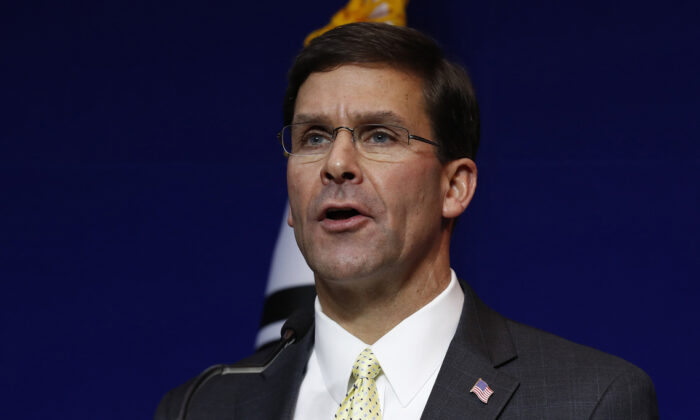Both the United States and South Korea said they would postpone upcoming joint military drills in a bid to bolster peace efforts with North Korea, while also assuring that military readiness would remain at high levels.
U.S. Defense Secretary Mark Esper said on Nov. 17 that the decision was not a concession to Pyongyang but that it was part of a “good faith effort” to reignite peace talks that had been stalled in recent months.
“I don’t see this as a concession. I see this as a good faith effort … to enable peace,” Esper told reporters as he announced the decision alongside South Korean counterpart Jeong Kyeong-doo in Bangkok, where Asian defense chiefs are gathered for talks.
“I think creating some more space for our diplomats to strike an agreement on the denuclearization of the peninsula is very important,” he said.
The drills, known as the Combined Flying Training Event, were slated to begin in the coming days. It would have involved simulated air combat scenarios as well as an undisclosed number of warplanes from both the United States and South Korea. The exercises had already been previously limited in scale and scope over the past few years, but North Korea still had issued objections.
Just earlier this month a top U.S. state department official described in a speech that building a successful peace regime on the Korean Peninsula must be negotiated in talks with the DPRK and said it can be achieved if negotiation efforts are successful.
Alex Wong, an official who serves as both the deputy assistant secretary and deputy special representative for North Korea made his comments at a Washington forum at the headquarters of the Center for Strategic and International Studies, a nonprofit think tank.
Wong said building a “stable peace regime” was a key pillar of the Singapore summit joint declaration that President Donald Trump signed with North Korean leader Kim Jong Un in June 2018. He said it was an integral part of the president’s vision for “a bright future for the DPRK.”
The peace regime concept would create a strategic shift throughout the Korean Peninsula that would advance the interests of all stakeholders involved, Wong said in his remarks.
“[It would] make even more clear than it is today that the DPRK’s weapons of mass destruction programs, rather than being a source of security for the DPRK—are a key driver of the DPRK’s insecurity,” he added.
In October, negotiations between U.S. and North Korean officials in Stockholm, Sweden, broke down, with the two countries leaving without any progress or deal made. It was the first round of talks between the countries in more than seven months.
It remains unclear whether the move to delay the drills will kickstart talks with Pongyang. The talks would involve getting the reclusive communist regime to give up its nuclear weapons program, but Esper expressed hope the gesture will garner a positive response.
“We encourage the DPRK to demonstrate the same goodwill as it considers decisions on conducting training, exercises, and testing,” he said. “We also urge the DPRK to return to the negotiating table without precondition or hesitation.”
As talks stall, North Korea has tested the limits of engagement with a string of missile launches.
KCNA, North Korea’s state news agency, said on Oct. 31 they had conducted successful tests of their “super-large multiple rocket launchers,” which drew protests from neighboring Japan and South Korea. That test was the first since the talks in Sweden.
Asked when the United States and South Korea would hold the postponed drills, South Korea’s Jeong declined to offer any sense of timing, saying only that it would be decided through “close coordination” with Washington.
North Korea said on Nov. 17 it had tried to interpret the U.S. adjustments to joint drills positively, but said the recent U.N. resolution criticizing North Korea’s human rights record had shaken that.
At the start of the talks of the three-way meeting with Esper and South Korea’s Jeong in Bangkok, Japanese Defense Minister Taro Kono cautioned against optimism and called for the three nations to ensure military readiness.
Trump became the first sitting U.S. president to set foot in North Korea when he met with Kim in June at the Demilitarized Zone (DMZ) between the two Koreas.
Reuters contributed to this report
This article is from the Internet:US, South Korea Postpone Military Drills in Push for Peace With Pyongyang
